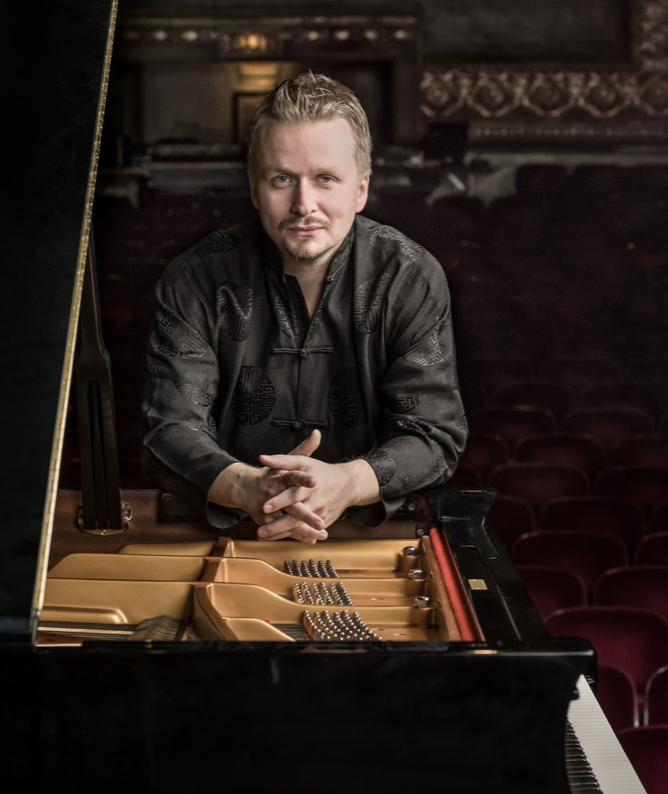|
Symphony
SRS SEASON ENDS WITH RESOUNDING TA-TA-TA-BANG
by Terry McNeill
Sunday, June 1, 2025
Symphony
YOUTHFUL VIRTUOSITY ON DISPLAY AT USO'S MAY CONCERTS
by Peter Lert
Saturday, May 17, 2025
Symphony
MYSTICAL PLANETS AND LIVELY GERSHWIN ORTIZ AT FINAL SRS CONCERT
by Peter Lert
Sunday, May 4, 2025
Symphony
VSO'S CONCERT MUSIC OF TIME, MUSIC OF PLACE
by Peter Lert
Sunday, April 27, 2025
Choral and Vocal
VOCAL ELEGANCE AND FIRE AT THE 222'S RECITAL APRIL 26
by Pamela Hicks Gailey
Saturday, April 26, 2025
CANTIAMO SONOMA SINGS AN INSPIRED GOOD FRIDAY MOZART REQUIEM CONCERT
by Pamela Hicks Gailey
Friday, April 18, 2025
DRAMATIC SHOSTAKOVICH SYMPHONY CLOSES PHILHARMONIC'S 25TH SEASON
by Terry McNeill
Sunday, April 13, 2025
LARGE COLLEGE OF MARIN AUDIENCE GREETS STOPHER ARTISTRY
by Terry McNeill
Saturday, April 5, 2025
Chamber
FRISSON DELIVERS SHIVERS OF DELIGHT
by Abby Wasserman
Sunday, March 30, 2025
OLD AND MOSTLY NEW IN SRS MARCH CONCERT IN WEILL
by Peter Lert
Saturday, March 22, 2025
|
 |
 Pianist Ilya Yakushev |
DYNAMIC PIANISM IN YAKUSHEV MARIN RECITAL
by Terry McNeill
Sunday, January 23, 2022
Russian pianist Ilya Yakushev arrived Jan. 23 at his Mill Valley Chamber Music Society recital with the repute of playing loud and fast and delivering charming introductory musical remarks to his audience.
He was true to form in Mill Valley’s Mt. Tamalpais Methodist Church, preceding Haydn’s splendid D Major Sonata from 1780 (Hob. XVI:37) with perceptive comments on the composer, as well as extolling the excellence of the afternoon’s bright sounding instrument and adding personal sidelights. Tempos in the opening Allegro were swift indeed, and the concluding Presto was played aggressively. The pianist enjoyed emphasizing the sforzandos throughout, and fast tempos work well for this work. The transition from the lovely Adagio to the finale was played with just a hint of suspense.
Perhaps more sonic contrast would have been welcome in Mr. Yakushev’s reading, but it was Haydn of restrained excitement and profile.
The first half ended with Beethoven’s “Tempest” Sonata, the only one he wrote in D Minor, Op. 31, No. 2. Here the musical terrain is much different, and the many runs would have been more effective if the half damper pedal the pianist constantly used was less. However, the subtle pedaling in the ghostly recitatives was exact, and gave shape to the dramatic sections. The chosen tempo was brisk.
Keeping the rhythms even was carefully accomplished in the Adagio with accurate left-hand cross notes, but with ample pedal.
The Rondo (Presto) was played without any pounding and at a hurried clip, and the artist seemed happiest when his fingers were hitting a lot of notes in a short span, albeit with some phrase blurring. Well, you can get away with a lot in a movement built on a persistent four-note motive, and the music had fetching momentum in the interpretation that ended softly and generated a short standing ovation from the 125 masked and COVID distanced people in the church.
After intermission Scriabin’s Op. 9 Prelude (for the left hand) was ravishingly played. Originally Mr. Yakushev had programmed Rachmaninoff’s G Minor Prelude from Op, 25 to follow, but announced the insertion of Chopin’s C-Sharp Minor Nocturne, Op. 27, No. 1, as natural transition to the Rachmaninoff. Composed in 1835, the Nocturne was performed with the requisite nostalgia and had a strong mid-work climax. The muscular Prelude with its noble middle section was a sharp contrast, and Mr. Yakushev pushed the tempo and his chosen phrasing and potent repeated chords were assertive.
Arguably the most played 20th Century piano sonata, Prokofiev’s volcanic B Flat work from 1943, Op. 83, ended the recital. It was a performance akin to one several years ago in nearby Weill Hall from Mr. Yakushev’s countryman Denis Matsuev – fast and menacing throughout. Oddly he used the shift pedal for some held tenor notes that gave a piquant spice to the performance in the romantic Andante Caloroso, but otherwise he roared through the score with impressive bass register sonority. Unlike the gold standard Horowitz recordings that start the Precipitato slowly and then build, this performance, with a nod to some inner voices, was always full throttle, and elicited a roar of audience approval.
One encore was offered, Gershwin’s bluesy and insistent left-hand motive Prelude from his set written in 1934. It evoked a lovely erotic languor and summer heat.
Abby Wasserman contributed to this review
|

